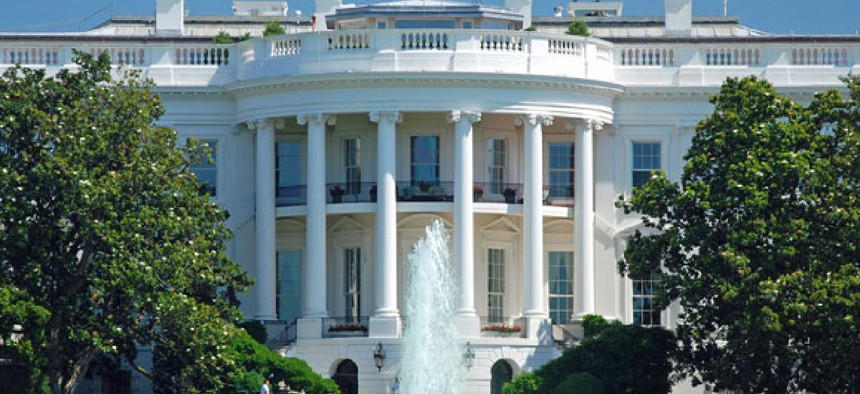
Vacclav/Shutterstock.com
White House 'cliff' offer to Boehner called 'break from reality'
Republican aide says proposal is not balanced.
Speaker John Boehner, R-Ohio, on Thursday rejected a White House plan to avert the so-called fiscal cliff at year’s end that would generate nearly $1.6 trillion in new tax revenue over the next decade and require Republicans to allow Congress to relinquish its control over the nation’s statutory borrowing limits.
“A complete break from reality,” is how the plan, delivered to Boehner and other congressional leaders by Treasury Secretary Timothy Geithner at their Capitol offices, was described by a congressional Republican aide familiar with what was proposed. President Obama’s liaison to Congress, Rob Nabors, also was at the meetings.
At a news conference after the meeting, Boehner revealed no specifics of the White House plan, but said generally there had been “no substantive progress” in talks over the past two weeks. He also accused the White House and Democrats of refusing to offer specific spending cuts.
The White House and congressional leaders are trying to prevent the combination of more than $500 billion in automatic tax hikes and spending cuts from taking place at the start of January. The impact is seen as potentially further damaging the nation’s fragile economy.
According to the congressional Republican source, what Geithner did offer Boehner and other congressional leaders is a plan that would instead call for $1.6 trillion in tax hikes -- all upfront -- in exchange for $400 billion in spending cuts later. The proposal also would extend the 2-percentage-point payroll-tax cut and allow as much as $50 billion in stimulus spending on infrastructure projects.
The only entitlement changes they proposed came from the president’s budget, said the aide, who emphasized the White House offer is not just unrealistic, but unbalanced.
"They also want a permanent, unlimited debt-limit increase -- for free," the aide added. That was a reference to a request that Congress give up its authority over federal borrowing to avoid another showdown over increasing the nation’s borrowing authority. The government is expected to hit the limit as early as next month.
“No additional cuts or reforms,” the aide said of the plan, though it would also boost spending to extend unemployment benefits and delay looming cuts to Medicare payments to doctors.
In averting the fiscal cliff, the plan would prevent the $109 billion in automatic sequestration spending cuts set to kick in on Jan. 2.
But the aide complained: “There were only seven weeks between Election Day and Christmas. The White House has now completely wasted three of them. After weeks of negotiations, they just demanded all of their favorite proposals, with no sign of compromise whatsoever.”
Still, House Democrats led by Minority Leader Nancy Pelosi of California were optimistic that a deal could be reached by year's end.
“This doesn’t have to be a cliff-hanger,” said Pelosi, during a late afternoon news conference, after she and other top House Democrats met with Geithner.
Pelosi said she was confident that Republicans will come around and “see the light” to freeze tax rates at current levels for a majority of Americans -- the “middle-income tax cut” that would cover net personal incomes up to $250,000 -- but let the lowered rates on income in excess of that amount expire as part of a broader, final deal. That is what the Senate already has already passed. The added revenue gained through the expiration of the high-end tax cuts is estimated to reach at least $800 billion, she said.
“This is a big down payment that we are suggesting and it opens the road to much more,” Pelosi said. “In terms of what we do in terms of addressing strengthening entitlements, reforming the tax code, (and) making further cuts that we can do in the next Congress.”
House Budget Committee Ranking Member Chris Van Hollen of Maryland echoed Pelosi, and said the optimism that Republicans might budge on their refusal to pass just the middle-class tax cut extension is based on comments from some Republicans themselves, such as Rep. Tom Cole of Oklahoma, that tax rates should be frozen at the current levels for most of Americans in time for Christmas, and consider what to do about the 2 percent who see the rate on their excess income rise later.
Van Hollen said he thinks Boehner’s House Republican Conference is “reading the tea leaves, they’re beginning to look into the future.” And like Cole, he said, more are recognizing that their insistence that the tax rates on portions of net incomes above the $250,000 threshold also should be frozen is an “unsustainable position.”
(Image via Vacclav/Shutterstock.com)
NEXT STORY: Mitt Romney and Paul Ryan meet up in D.C.







